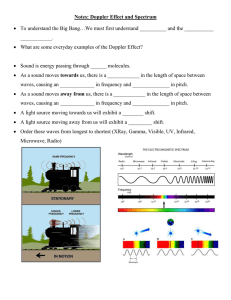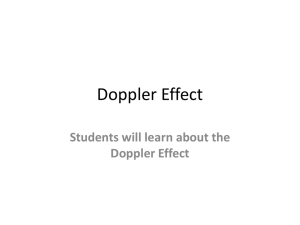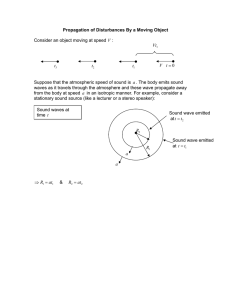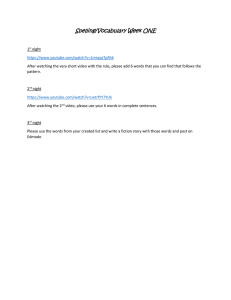It creates a longitudinal wave. Essential Question (pg. 81): What
advertisement
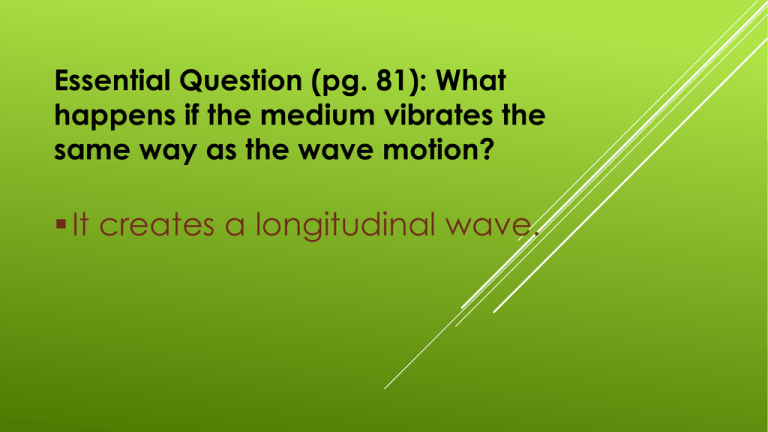
Essential Question (pg. 81): What happens if the medium vibrates the same way as the wave motion? It creates a longitudinal wave. Which direction does the medium vibrate in relation to the wave motion for a longitudinal wave? • It vibrates parallel to the wave motion. Can a longitudinal wave travel in outer space? • No, longitudinal wave is a mechanical wave, meaning that it must travel through a medium and since there are no air particles in space, therefore, longitudinal waves cannot exist. Your Question: What are compressions? • Places where particles of a medium crowd closer together. Essential Question (pg. 85): How are sounds made? • They are vibrations in the form of wave energy. What must happen for us to hear a sound? • When an object vibrates it compresses surrounding air molecules and makes them vibrate. (each molecule makes the one next to it vibrate) Can sound exist in space? • No, Because there are no particles in in space to vibrate. Therefore, There is no medium in space. What is the difference between the pitch and the loudness of sound? • Pitch: depends on frequency, meaning how many waves are created in a given amount of time. • Loudness: depends on amplitude, which is the intensity of the energy transferred. What is the SI unit for: Pitch: Hertz (Hz) Volume: Decibels (dB) Why does sound travel faster in solids than liquids: • Sound travels faster in solids than liquids, because in solids the particles are closer to each other, therefore, they can easily pass the energy of vibration to nearby particles. Essential Question (pg. 91): Why do cars sound different when they drive past me? The perceived change in pitch and volume of a moving car passing a stationary person is due the Doppler Effect. How will the sound of a train whistle change if the train is moving away from me? The sound of the train will be heard as a lower pitch and volume, because as the train moves away from a stationary person, the waves spread out behind the train. What causes the Doppler Effect? Doppler effect happens when: 1. The source of sound is moving relative to the stationary listeners. 2. The source of sound is stationary relative to the moving listeners. Do the Frequency and the amplitude of the sound source actually change? • No, they seem to be changing because the sound source is moving relative to the listeners. Essential Question (pg. 93): How does science help us understand how instruments work? It helps us understand how “sound” is created as a result of vibrating of objects. What do all musical instruments have in common? 1. They all create sound by causing matter to vibrate. 2. Most instruments use resonance to amplify sound. 3. Most instruments have a way of changing frequency of the sound. What is resonance? Resonance occurs when external vibrations match an object’s natural vibration or when vibration of one object causes another object to vibrate at the same frequency. Your Question: which part of the wave does resonance increase? Resonance increases amplitude of vibration is increased. Essential Question (pg. 97): How do scientists and engineers use sound? They use sound in different technologies such as: • sonar to locate objects like submarines underwater. • Ultrasonography to see inside the human body. How does a bat find its food at night? Echolocation: It sends out ultrasound waves and use their echo/reflection in order to locate objects they cannot see. Explain how a fisherman's’ fish finder works? • Uses a sonar system, which sends and receives ultrasounds to locate the fish. What is the formula used to calculate distance? Distance = Speed x Frequency Bill nye: https://www.youtube.com/watch?v=j1Q5TFMqsFo Longitudinal vs. Transverse: https://www.youtube.com/watch?v=7cDAYFTXq3E Frequency vs. volume https://www.youtube.com/watch?v=YTZcSaPn92s Breaking wine glass using resonance: https://www.youtube.com/watch?v=IZD8ffPwXRo Washing machine breaking due to resonance: (start from 15 seconds) https://www.youtube.com/watch?v=vROdVsU_K80 How sonar works https://www.youtube.com/watch?v=Hx0G2712QiA Dolphins and bats https://www.youtube.com/watch?v=Odq7W2u2Xj8 The Doppler Effect: https://www.youtube.com/watch?v=h4OnBYrbCjY Resonance causing destruction (Tacoma bridge destruction, 1940) https://www.youtube.com/watch?v=nFzu6CNtqec Wave Medium Frequency Mechanical waves Decibels Pitch Transverse waves Electromagnetic waves Longitudinal waves (compression waves) Compression rarefaction Wavelength Volume Sound amplitude Hertz

